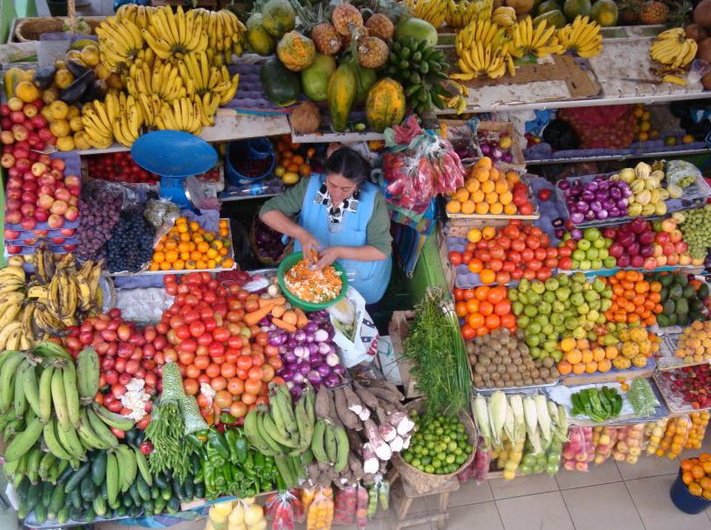October is Vegetarian Awareness Month: It’s so easy to go green in Ecuador!
By Ginger Hultin, MS, RD, CSO
From Meatless Monday to consumer questions about vegetarianism for children, general health or medical conditions, and an ever-increasing rate of veggie-based foods on menus at restaurants, hospitals and facilities, dietitians need to feel comfortable working with this type of cuisine. Whether already committed or veggie- curious, join the celebration of Vegetarian Awareness Month, which kicked off with World Vegetarian Day on October 1st, and ends with World Vegan Day on November 1st of each year.
curious, join the celebration of Vegetarian Awareness Month, which kicked off with World Vegetarian Day on October 1st, and ends with World Vegan Day on November 1st of each year.

Cuenca mercados are full of fresh produce at very affordable prices!
Reasons to celebrate Vegetarian Awareness Month, even for non-vegetarians
Taste! Vegetarian meals are delicious, fast and easy. Meatless food is far from boring; experimenting with antioxidant-rich herbs, spices and sauces for flavor can be fun for chefs and families alike.
Meatless Monday has gained national and worldwide attention. Your facility may ask you to help institute this practice into its menu plan. Gaining knowledge about meatless meals can help save money and time and increase dietary micronutrients and fiber for your clients or coworkers.
Save money. Meat accounts for an estimated 10 percent of American food-spending. Eating vegetables, grains and fruit in place of the roughly 250 pounds of beef, chicken and fish each non-vegetarian eats annually could cut individual food bills by an average $4,000 per year.
Vegetarian diets are statistically higher in fiber. Though 25-38 grams of fiber per day is recommended, the typical American consumes only 12-15 grams. Increasing whole grains, legumes and fresh produce can easily help achieve the goal. For example, a pound of beef contains zero grams of fiber, but just one cup of lentils has 16 grams.
A love of animals — in the U.S., ten billion animals are slaughtered for human consumption each year. Some of these are factory-farmed and fed a diet tainted with pesticides, hormones and antibiotics. Help protect animals by going vegetarian during October.
Respect for the environment and sustainability. From water protection to soil and air quality, raising animals strains our natural world more than growing plants. Beef in particular is known for being environmentally taxing due to the quantity and types of feed consumed, as well as their methane production.
Health! Studies show that vegetarian diets are statistically higher in vitamins A, B2, C and E, beta carotene, calcium and folate than non-vegetarian diets. There is also recent research that indicates vegetarians experience a significantly lower overall incidence of cancer and a lower BMI than non-vegetarians.
__________________
Ginger Hultin, MS, RD, CSO, is a Spokesperson for the Academy of Nutrition and Dietetics and a Seattle-based health writer specializing in integrative health and nutrigenomics. Read Ginger’s blog, Champagne Nutrition, and follow her on Facebook, Instagram, Pinterest and Twitter.
Credit: Food & Nutrition Magazine® | Academy of Nutrition and Dietetics





















